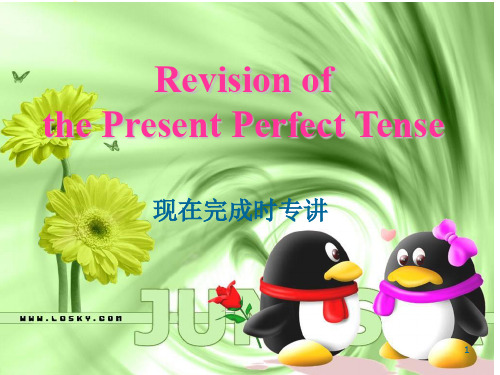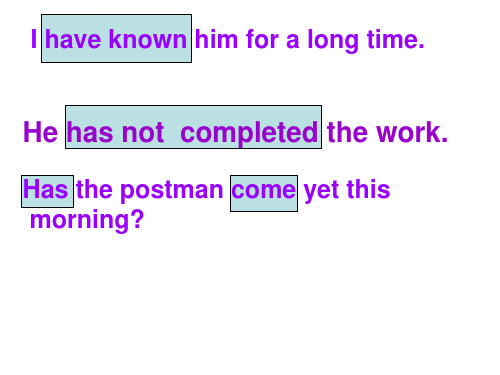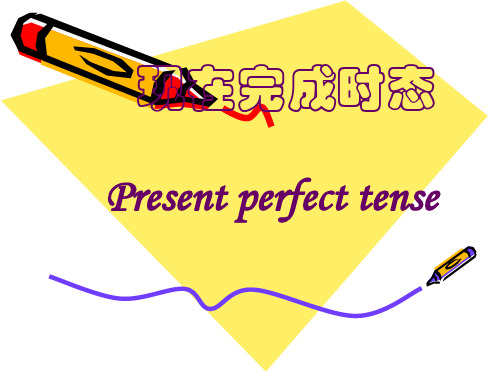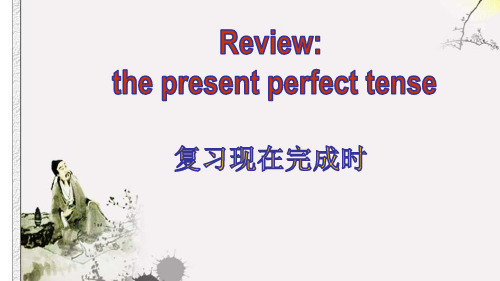现在完成时公开课共28页
合集下载
现在完成时公开课课件

REPORT
CATALOG
DATE
ANALYSIS
SUMMAR Y
04
现在完成时与一般过去 时的区别
时间上的区别
总结词
现在完成时与一般过去时在时间上有 明显区别。
详细描述
现在完成时表示动作发生在过去,但 与现在存在关联,强调对现在的影响 或结果。而一般过去时仅表示动作发 生在过去,与现在没有直接关联。
DATE
ANALYSIS
SUMMAR Y
01
现在完成时的定义和构 成
定义
总结词
现在完成时是英语语法中的一种时态,表示某个动作已经发生,并对现在产生 影响或结果。
详细描述
现在完成时是用来描述过去发生的动作或状态,但这个动作或状态与现在的情 况有直接关系。它常常与一些时间状语连用,如"already"(已经)、"yet"(还 )、"just"(刚刚)等。
总结词
强调动作或状态从过去到现在一直持续 发生或存在。
VS
详细描述
现在完成时可以用来表示某个动作或状态 从过去某个时间点一直持续到现在,强调 时间的延续性。这种用法常用于描述习惯 、经历或历史事件。例如,“He has lived in this city for ten years”(他在 这个城市住了十年)。
REPORT
CATALOG
DATE
ANALYSIS
SUMMARY
现在完成时公开课课 件
目录
CONTENTS
• 现在完成时的定义和构成 • 现在完成时的基本用法 • 现在完成时的特殊用法 • 现在完成时与一般过去时的区别 • 现在完成时的常见错误 • 现在完成时的练习与巩固
现在完成时公开课ppt课件

规则动词
• (1)一般动词,在词尾直接加“ ed ”。
• work---worked---worked ,visit---visited---visited
• (2)以“ e ”结尾的动词,只在词尾加“ d ”。
•
live---lived---lived
• (3)以“辅音字母 + y ”结尾的动词,将 "y" 变为 "i" ,再加 “ ed ”。
Revision of the Present Perfect Tense
现在完成时专讲
1
复习目录
• 现在完成时态的概念 • 现在完成时态的结构 • 现在完成时态的否定,疑问形式 • 现在完成时态的用法 • 现在完成时态与一般过去式的比较 • 现在完成时态练习
2
冬天来了,春天还会远吗?
If winter has already come, can spring be far behind?
3
1.现在完成时的概念
1)表示过去发生或已完成的动作对现在造成的影 响或结果;
2) 表示过去已经开始并一直持续到现在的动作或 状态。
E.g. He has learned English since 2001.
现在完成时
past 一般过去式
now 现在进行时
future 一般将来时
4
一. 结构 1.肯定句: have / has + p.p.(过去分词) 2.否定句: have/has + not + p.p.(过去分词) 3.一般疑问句: Have / Has 提到句首 Yes, … have / has. No, … haven't /hasn’t.
现在完成时态公开课ppt课件

the Present Perfect Tense
Form: have/has + done Negative form: have/has not done Question form: Have/Has +主语+done
No Image
严格执行突发事件上报制度、校外活 动报批 制度等 相关规 章制度 。做到 及时发 现、制 止、汇 报并处 理各类 违纪行 为或突 发事件 。
现在完成时 PK 一般过去时:
• 现在完成时: 强调动作对现在产生了结
果和影响.
2.一般过去时: 只表示过去的动作和状态.
强调动作. 若有时间状语:yesterday, last week,…ago, in1980, in October,
justNo Image
now,用一般过去时
严格执行突发事件上报制度、校外活 动报批 制度等 相关规 章制度 。做到 及时发 现、制 止、汇 报并处 理各类 违纪行 为或突 发事件 。
严格执行突发事件上报制度、校外活 动报批 制度等 相关规 章制度 。做到 及时发 现、制 止、汇 报并处 理各类 违纪行 为或突 发事件 。
Summary (4):
我们用现在完成时表示反复发生的动作。
• You don't need to describe her. I ___ her several times.
• While we have not dismissed the idea, we are looking into other possibility as well.
严格执行突发事件上报制度、校外活 动报批 制度等 相关规 章制度 。做到 及时发 现、制 止、汇 报并处 理各类 违纪行 为或突 发事件 。
Form: have/has + done Negative form: have/has not done Question form: Have/Has +主语+done
No Image
严格执行突发事件上报制度、校外活 动报批 制度等 相关规 章制度 。做到 及时发 现、制 止、汇 报并处 理各类 违纪行 为或突 发事件 。
现在完成时 PK 一般过去时:
• 现在完成时: 强调动作对现在产生了结
果和影响.
2.一般过去时: 只表示过去的动作和状态.
强调动作. 若有时间状语:yesterday, last week,…ago, in1980, in October,
justNo Image
now,用一般过去时
严格执行突发事件上报制度、校外活 动报批 制度等 相关规 章制度 。做到 及时发 现、制 止、汇 报并处 理各类 违纪行 为或突 发事件 。
严格执行突发事件上报制度、校外活 动报批 制度等 相关规 章制度 。做到 及时发 现、制 止、汇 报并处 理各类 违纪行 为或突 发事件 。
Summary (4):
我们用现在完成时表示反复发生的动作。
• You don't need to describe her. I ___ her several times.
• While we have not dismissed the idea, we are looking into other possibility as well.
严格执行突发事件上报制度、校外活 动报批 制度等 相关规 章制度 。做到 及时发 现、制 止、汇 报并处 理各类 违纪行 为或突 发事件 。
人教版初中英语现在完成时知识讲解公开课ppt课件

3.
— Has Tom left our town? — Yes, he has.
— And how long has he been away?
— About two hours.
疑问句:(疑问词)Have/Has + 主语 + 过去分词?
Time Expressions with Present Perfect Tense 现在完成时常用的时间短语
4 John Martin: Oh, look at that huge apartment block! Xiao Li: Yes, they have just completed it.
Conclusion:现在完成时表示一个到现在时间为止已
经完成了的、对现在有影响的动作或状态。(现在完成 时的已完成用法)
Conclusion: 现在完成时未完成用法往往同包含现在时间 在内的时间状语连用, 如so far, up to now, till now, all one’s life等。
Time Expressions with Present Perfect Tense 现在完成时常用的时间短语
1 We have often been there. 2 I have sometimes had letters from him.
2 Up to now, I’ve understood everything the teacher’s said.
3 We’ve had very good weather this winter, till now.
4 Am I right in thinking that you've lived here all your life?
现在完成时(上课用)ppt课件

15. give _G_iv_e_n___
16. get ___g_ot_te_n___
17. knowK_n_o_w_n___ 19. writeW__ri_tt_en___
18. open _o_p_e_ne_d__ 20. forget f_or_g_o_tt_en___
最新版整理ppt
10
二) 含义:
Yes, S+have/has.
No, S+have/hasn’t.
最新版整理ppt
15
(改为否定句和一般疑问句并肯否回答) I have seen him since his wedding day.
→Have you seen him since his wedding day?
→I haven’t seen him since his wedding day .
Eg. I have already done my homework. 否定句: I haven’t done my homework yet. 一般疑问句: Have you done your homework yet?
最新版整理ppt
21
3. ever在现在完成时中的用法
肯定句/疑问句 : 句中 “曾经” Eg. I’ve ever been to Beijinen to,have / has gone to, have / has been in的用法区别
1 “ Have /has been to+地名 ”表示曾经去过某地,说话时已
经回到说话地点,常与once 、twice、ever、never 等时间连
用。
What have they just done?
现在完成时讲解课件

come/go (to) --be (in/at)start/begin-- be on
arrive (at/in)-- be (in/at) die-- be dead
get (to)-- be (in/at) close-- be closed
reach-- be (in/at)
buy-- have borrow-- keep
注2): 对for或since引导的时间状语提 问 必须用how long, 决不能用when. Eg. I have lived here for 10 years. How long have you lived here? She has stood here since 2 hour ago. How long has she stood here?
c) never 是否定词,表示“从来没有”,而
ever 表示“曾经”
• We have never been to the Great Wall. 我们从来没有去过 长城。 • Have you ever been to Canada?
你们曾经去过加拿大吗?
※短暂性动词与 延续动词间的转 换
leave-- be away (from) join-- be in/be a/an…
since的四种用法
postgraduate student.
注 1): since 也可单独使用 , 表示 “自那时起”; 另外since前也可加 上ever,以加强语气. Eg. I have been here (ever) since. I have been here (ever) since I graduated in 2000.
现在完成时的主要用法
arrive (at/in)-- be (in/at) die-- be dead
get (to)-- be (in/at) close-- be closed
reach-- be (in/at)
buy-- have borrow-- keep
注2): 对for或since引导的时间状语提 问 必须用how long, 决不能用when. Eg. I have lived here for 10 years. How long have you lived here? She has stood here since 2 hour ago. How long has she stood here?
c) never 是否定词,表示“从来没有”,而
ever 表示“曾经”
• We have never been to the Great Wall. 我们从来没有去过 长城。 • Have you ever been to Canada?
你们曾经去过加拿大吗?
※短暂性动词与 延续动词间的转 换
leave-- be away (from) join-- be in/be a/an…
since的四种用法
postgraduate student.
注 1): since 也可单独使用 , 表示 “自那时起”; 另外since前也可加 上ever,以加强语气. Eg. I have been here (ever) since. I have been here (ever) since I graduated in 2000.
现在完成时的主要用法
新概念2_lesson28_现在完成时(公开课)ppt

New words
adj. 罕见的, 稀薄的,三分熟 adj. 古代的,古老的 n. 神话故事 n. 麻烦 vt. 麻烦;使烦恼 effect n. 结果,效果 Medusa n. 美杜莎(古希腊神话中3位蛇发女怪之 一) Gorgon n. (古希腊神话中的)3位蛇发女怪之一 (凡见其貌者都会变成石头) rare ancient myth trouble
Waiter: How would you like your steak (to be cooked)? I prefer/would like……
steak [steik] n. 牛排 牛排几分熟: well done : 全熟
•
Well done!【口语】干得漂亮
medium well: 七分 medium : 半生半熟的 五分 adj.中间的, 中等的, 半生熟的 medium rare: 四分 rare : 几乎生的,三分熟(西冷牛排)
• none 可指人也可指物,作主语时,如和 of 连用指不 可数名词时,谓语动词要用单数形式;指可数名词时, 谓语动词用单、复数均可。如: • No one likes smoking . Nothing is difficult in the world if you put your heart into it. None of them has / have a car. None of this money is mine.
练习2
按要求改写下列句子:
1) We have visited the museum. (改为一般疑问句) 2) They have seen the film. 3) He has returned the book. (改为否定句) (对划线部分提问)
M2U1语法---现在完成时与现在完成进行时-公开课课件

现在完成进行时与现在完成时的区别如下:
1.现在完成时与现在完成进行时
I have written an article. 强调: 已完成性
I have been writing an article. 强调:持续性, 尚未完成
2.有些延续性动词,如live, teach, work, study, learn, stay等因现在
• She has had a good education. 她受到过良好的 教育。(影响是她文化水平高,有修养)
第5页,共36页。
2.从过去持续到现在的动作(延续性动词或表状态的形
容词)
现在
time
时间段:
since/so far:从过去到现在 in the past/few years:从过去到现在的几年
B. had come C. were coming D. have been coming
第24页,共36页。
Adventures
2. —I have got a headache.
—No wonder. You ________in front of that computer too long. A. work B. are working C. have been working
• 2.自从上周五晚我就没有看到贾斯丁。
I have not seen Justin since last Friday night.
• 3.该事件引起了公众的极大兴趣,原因是…. • This incident has received great interest
due to reports of alien visits… Present perfect tense
初中九年级英语《现在完成时》复习公开课PPT课件

QUIZ:
1.Great changes _h_a_v_e_ta_k_e_n_ (take) place in__t_h_e_p_a_s_t__fe_w___y_e_a_rs.
2He _h_as___g_o_n_e_(go) to Beijing. He _w__i_l_l_c_o__m__e__b_a_c__k__to__m__o_r_r_o__w.
Review & take notes 复习背记并整理笔记
前情回顾:现在完成时小结 助动词have/ has + done
(一)表示过去发生的动作或已完成的动作对现在造成的影响。 时间状语 just;already; yet ; ever ; never; recently,
lately, before, twice, …
(二)表示过去发生的动作一直持续到现在,有可能继续下去. (延续性动词)
1 -- Where is Jack? -- He _h_a_s_g_o_n_e_t_o the park.
2 -- __H_a_v_eyou_e_v_er b_e_e_n__t_o_ Paris? -- No, I _h_a_v_e_ never _b_e_e_n__ t_h_e_r_e_.
3 Mary _h_a_s_b_e_e_n__in_ Shanghai _si_n_c_e five years ago.
3My parents _m_a_r_r_ie_d__(marry) in__2_0_0_0_, theyh_a_v_e_b_e_e_n__m_a_r_ri_e_d(marry) fo_r _tw__e_n_ty__y_e_ar_s.
4We _h_a_v_e__p_l_a_n_te_d__(plant) two thousand trees _s_o_f_a_r_.
2014现在完成时讲解课件(九年级)公开课

解析
这句话表示“到目前为止还没 有写完”,所以用现在完成时
。
翻译题练习
01
02
03
04
翻译题1
他们还没有决定去哪儿度假。 (They haven't decided
where to go for vacation.)
解析
这句话表示“到目前为止还没 有决定”,所以用现在完成时
。
翻译题2
她还没有写完那篇论文。 (She hasn’t finished writing that paper.)
答案
has not finished
解析
yet用于否定句中,表示“还没有”,所以用现在完成 时。
填空题练习
填空题1
I ____(not read) the book yet. I ____ (read) it last month.
01
解析
第一空表示“到目前为止还没有读过 ”,所以用现在完成时;第二空表示 “上个月读了”,所以用一般过去时
时间状语的区别
"in 2013"
"between 2010 and 2015"
语义的区别
现在完成时
强调动作对现在的影响 或结果。
一般过去时
只强调动作发生在过去 。
例如
I finished my homework yesterday. (只强调写作业的动作发 生在昨天,不涉及现在 。)
06
现在完成时的练习与巩固
05
现在完成时与一般过去时 的比较
时间状语的区别
现在完成时 "already"
时间状语的区别
"just" "yet"
现在完成时态课件公开课课件

② before与ago,just与just
now
before表示现在看来的“以前”,常 单独用于现在完成时中,一般不与表示 一段时间的词语连用,而ago表示在过去 某时间的“以前”,常用“一段时间 +ago”的形式,与过去时连用;just常与 现在完成时连用,多用于句中助动词之 后修饰谓语动词,just now多与一般过去 时连用,一般用于句末。如:
现在完成时
The Present Perfect Tense
一 构成:
have/has+动词过去分词 (pp)
肯定 主语+have/has + pp 否定 主语+have/has not + pp 疑问 Have/Has + 主语+ pp+其他
Yes, 主+have/has. No, 主+haven’t/hasn’t.
I have been here (ever) since
then.
注2):对for或since引导的时间 状语提问用how long
I have lived here for 10 years. How long have you lived here?
She has stood here since 2 hour ago. How long has she stood here?
once, twice…
一次…
all/in one’s life
某人一生
(1)already
肯定句: “己经”
I’ve already had breakfast. (更常见) = I’ve had breakfast already.
一般疑问句: 句末(表示惊讶的语气) “难道”
